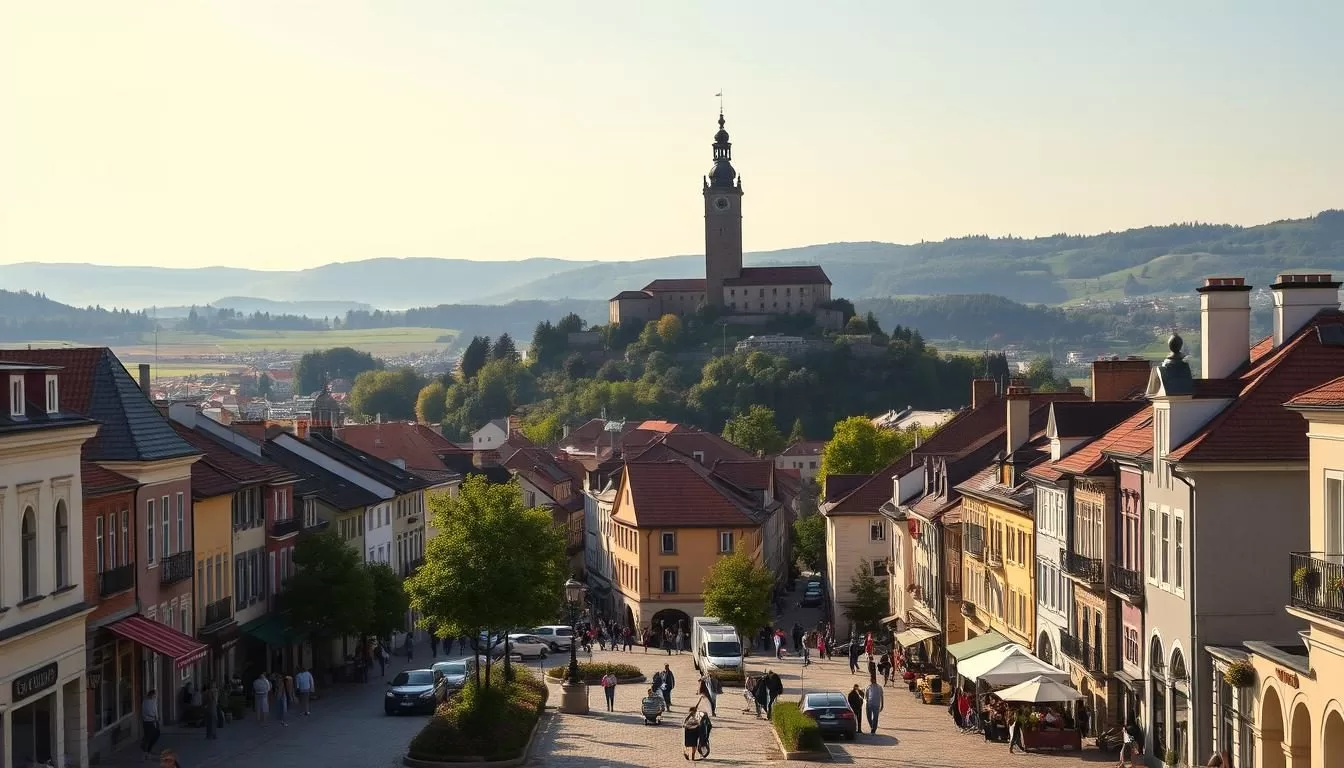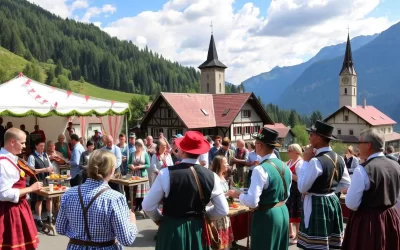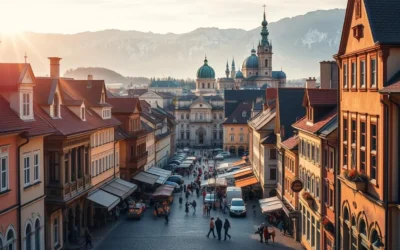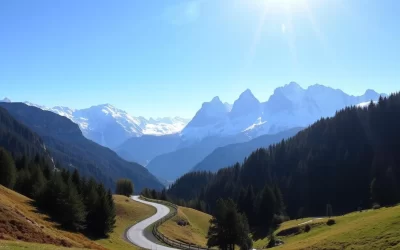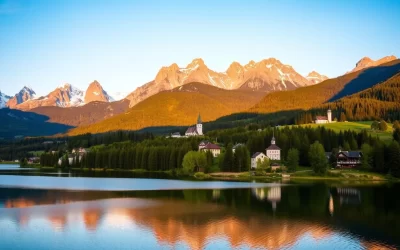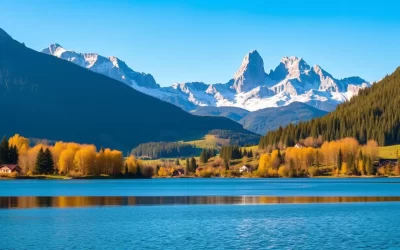✓ Accommodations✓ Flights✓ Rental Cars
Discover the charm of Graz, Austria’s second-largest city, where history meets modernity. As you explore this captivating city, you’ll uncover a unique blend of Mediterranean flair, historical significance, and contemporary attractions.
With its UNESCO World Heritage Old Town, stunning architecture, and hidden courtyards, Graz is an essential destination for any traveler seeking authenticity and discovery. You’ll experience the city’s iconic landmarks, savor local cuisine, and enjoy panoramic views that make Graz a must-visit destination in Austria.
Discovering Graz: Austria’s Hidden Gem
Tucked away in the heart of Austria, Graz is a treasure waiting to be discovered. As the capital of Styria, this city offers a unique blend of historical significance and modern attractions that make it an ideal destination for travelers.
Why Graz Should Be on Your Austria Itinerary
Graz is often referred to as Austria’s hidden gem, and for good reason. This city boasts a rich cultural heritage, having been a key residence of the Habsburgs in the 15th century. Today, visitors can explore its well-preserved old town, a UNESCO World Heritage site, and experience the vibrant atmosphere that comes with being a university town.
Some of the top reasons to visit Graz include its unique blend of historical and modern architecture, its culinary delights, and its cultural events. Whether you’re a history buff, a foodie, or simply looking for a new adventure, Graz has something to offer.
| Aspect | Description | Highlight |
|---|---|---|
| History | Graz has a rich history dating back to the Renaissance period. | Founding of the University of Graz in 1585 |
| Culture | The city is known for its cultural events and festivals. | Named European Capital of Culture in 2003 |
| Cuisine | Graz is renowned for its culinary delights. | Considered Austria’s culinary capital |
A Brief History of Styria’s Capital
Graz’s name derives from the Slavic word “gradec,” meaning “small town.” The city’s strategic importance grew in the 15th century when it became a Habsburg residence. Over the centuries, Graz has evolved from a medieval fortress town to a Renaissance jewel, and eventually, to the vibrant university city it is today.
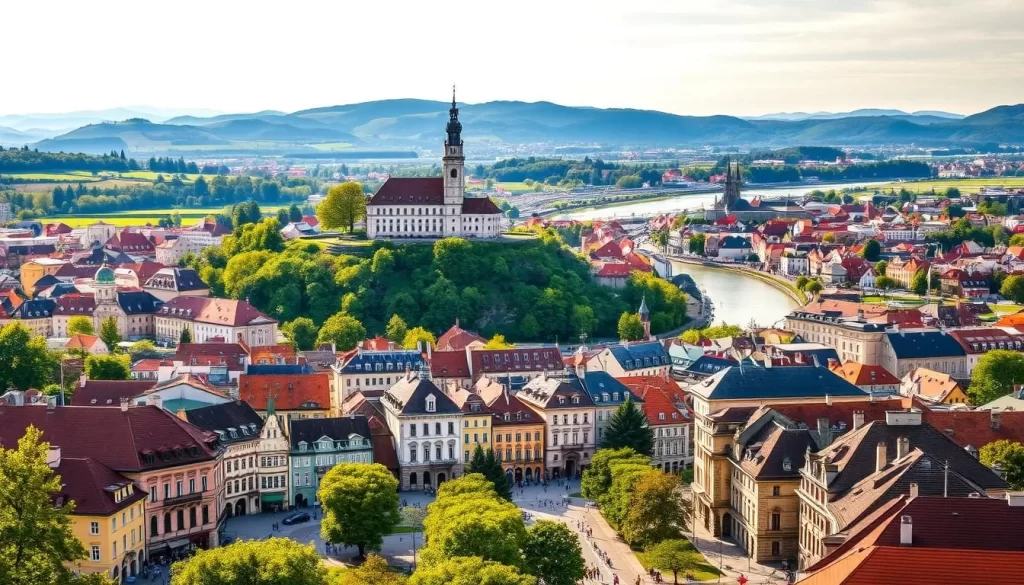
For a comprehensive guide to Graz, understanding its history is key. The city’s transformation over the centuries has resulted in a unique cultural landscape that is both historically significant and forward-thinking.
Exploring the UNESCO World Heritage Old Town
The historic heart of Graz is a UNESCO World Heritage Site, filled with stunning buildings and hidden gems. As you explore the city center, you’ll be struck by the elegance of the architecture and the charm of the narrow streets.
Hauptplatz: The Heart of Graz
Your journey through Graz’s Old Town begins at Hauptplatz, the main square that’s perfect for starting your exploration. The square is surrounded by impressive historical buildings, including the Rathaus (City Hall) and colorful Baroque structures that give Graz its distinctive aesthetic.
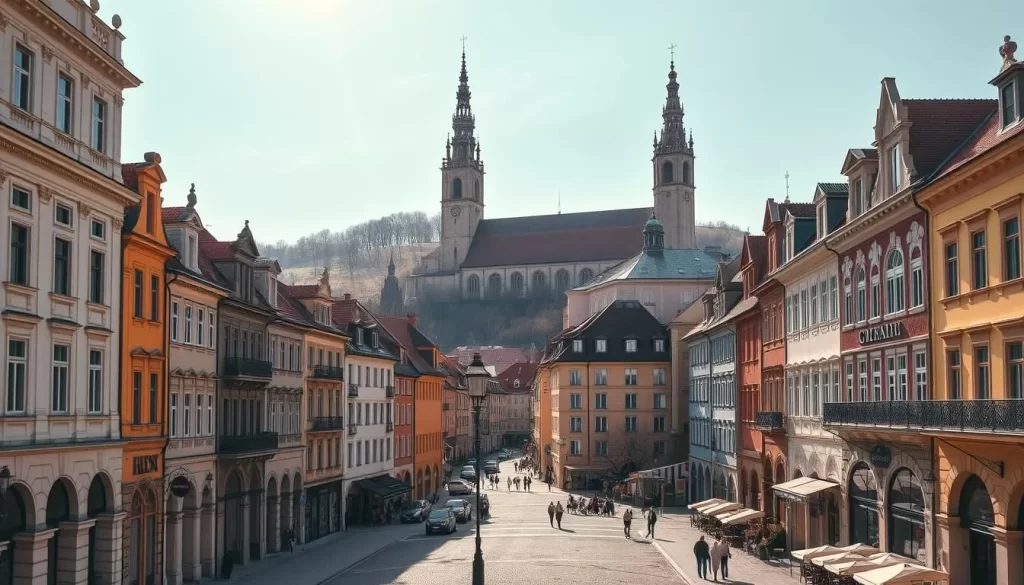
Herrengasse and Its Architectural Treasures
Just a short walk from Hauptplatz lies Herrengasse, an elegant pedestrian street lined with ornate mansions and historic buildings. Be sure to admire the eye-catching Luegghaus with its elaborate stucco façade, a masterpiece of local architecture.
Hidden Courtyards and Renaissance Buildings
As you wander through the Old Town, you’ll discover over 50 courtyards tucked away behind gateways and alleyways. Many feature arcades and arches, while others are tiny and peaceful. The Grazer Landhaus, with its stunning courtyard and Italianate windows, is a highlight of Renaissance architecture in Graz.
| Location | Main Attraction | Architectural Style |
|---|---|---|
| Hauptplatz | Rathaus (City Hall) | Baroque |
| Herrengasse | Luegghaus | Renaissance |
| Grazer Landhaus | Courtyard | Renaissance |
Schlossberg and the Iconic Clock Tower
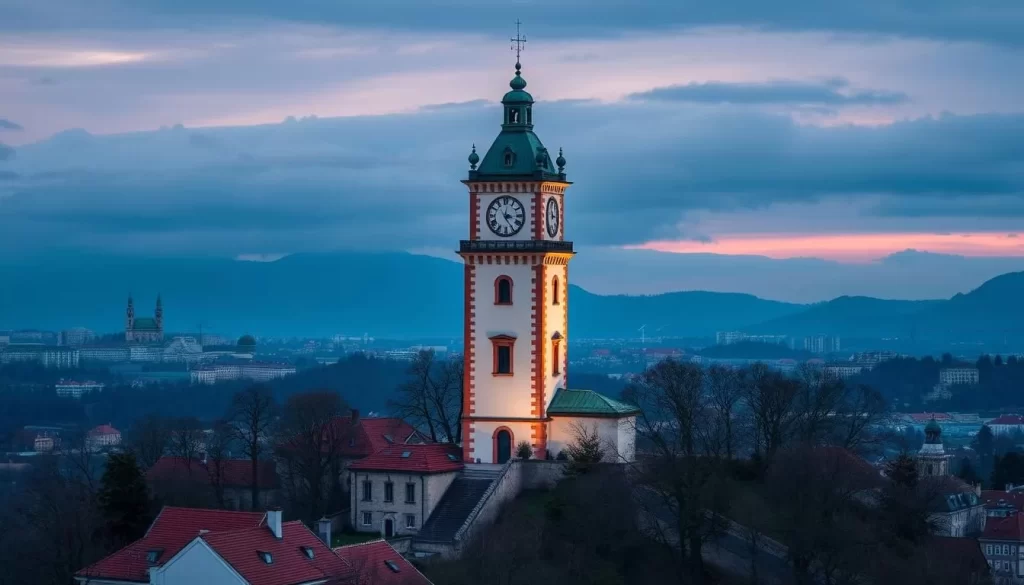
Perched atop the Schlossberg hill, the iconic Clock Tower stands as a testament to Graz’s rich history. This 16th-century clock tower is not only the city’s emblem but also one of its oldest buildings, offering a unique blend of historical significance and architectural marvel.
Climbing the Steps or Taking the Funicular
Visitors have multiple options to reach the Clock Tower. The energetic can climb the 260 steps, enjoying the beautifully maintained gardens along the way. This 15-minute journey allows for frequent stops to take in the stunning views of the city. Alternatively, one can opt for the funicular or the glass elevator built into the mountain for a more leisurely ascent.
The Unusual Clock and Panoramic Views
The Clock Tower is renowned for its quirky clock face, where the long hand indicates the hour and the short hand shows the minutes. Originally, the clock had only a long hand to display the hour, visible from a distance. The addition of a minute hand, which had to be shorter to fit the clock face, resulted in the reversed hands we see today. From the top, visitors can enjoy panoramic views of Graz’s terracotta rooftops, the Mur River, and the blend of historic and modern architecture.
The World’s Tallest Underground Slide

Experience the thrill of ‘The Slide’ in Graz, a unique way to descend from the Schlossberg hill back to the city center. As a relatively new addition to Graz’s vibrant cityscape, ‘The Slide’ is an oft-missed attraction lurking beneath the famous Schlossberg.
This isn’t just any slide; it’s the tallest underground slide in the world, standing at an impressive 64 meters tall and 175 meters long. It spirals down the elevator shaft back to the bottom of the hill in around 40 seconds, reaching speeds of up to 30 km/h. The experience is not for the faint-hearted, offering an adrenaline rush like no other.
The Slide Graz is priced at €6.00 for the slide, with an additional €2.40 for the lift to get up the hill. Here are some key details to help you plan your visit:
- Experience an adrenaline rush on the world’s tallest underground slide.
- Discover the slide’s impressive statistics: 64 meters tall, 175 meters long, and speeds of up to 30 km/h.
- Learn about ticket prices and what to expect during the exhilarating experience.
- Find out why ‘The Slide’ has quickly become a favorite among visitors looking for something beyond typical sightseeing activities.
- Get tips on the best time to visit to avoid long queues and how to prepare for the experience.
By incorporating ‘The Slide’ into your Graz itinerary, you’re not only experiencing a modern thrill but also witnessing the city’s blend of historical preservation and modern innovation. So, are you ready to take the slide and explore more of Graz’s hidden gems?
Graz, Austria: Best Things to Do – Top Picks for Architecture Lovers
Graz, Austria, is a treasure trove of architectural marvels that will captivate anyone with a passion for design and history. The city’s historic center is filled with stunning examples of Renaissance and Baroquearchitecture, making it a paradise for enthusiasts.
The Double Spiral Staircase
One of Graz’s most remarkable architectural feats is the Double Spiral Staircase, or Doppelwendeltreppe, located in the Graz Burg. Completed in 1438, this 15th-century engineering marvel features two staircases that spiral together yet remain separate until they meet at each floor. It’s also known as the “Staircase of Reconciliation” because it symbolizes how people taking different paths can eventually reunite.
The Painted House
Another architectural highlight is the Painted House, or Herzoghof, which boasts stunning frescos added in 1742 by Johann Mayer. This early example of decorative street art has become one of Graz’s most photographed buildings.
Landhaus Courtyard
The Landhaus is a stunning Renaissance building with a breathtaking courtyard featuring Italianate windows, open arched corridors, and an impressive three-story arcade. The heraldic symbol of Styria, the panther, is painted on the old green wooden doors, adding to the site’s historical significance.
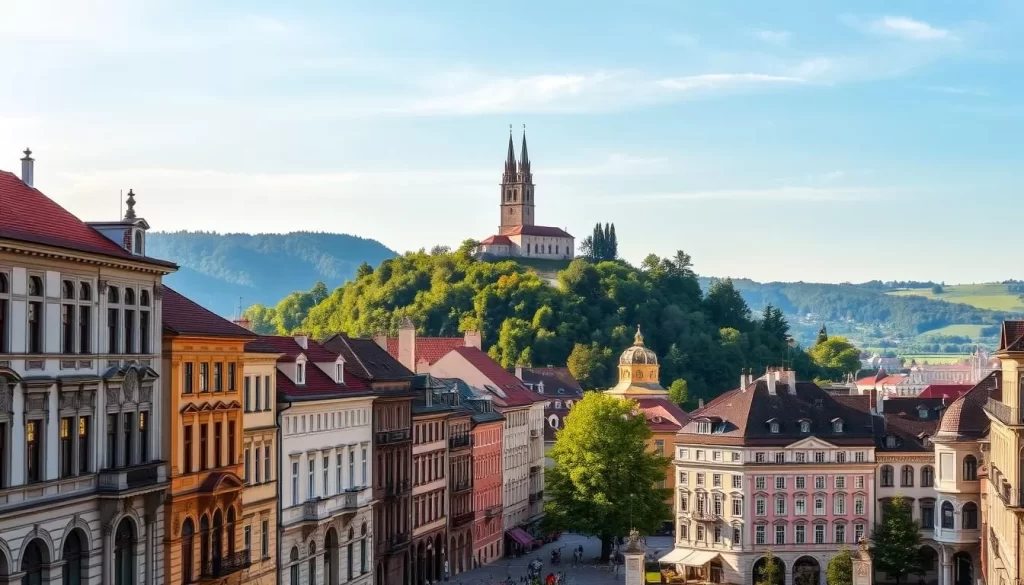
These architectural treasures not only showcase Graz’s rich cultural heritage but also earned the city its UNESCO World Heritage status. As you explore these sites, you’ll gain a deeper appreciation for the city’s unique blend of historical and architectural significance.
The “Friendly Alien” – Kunsthaus Graz
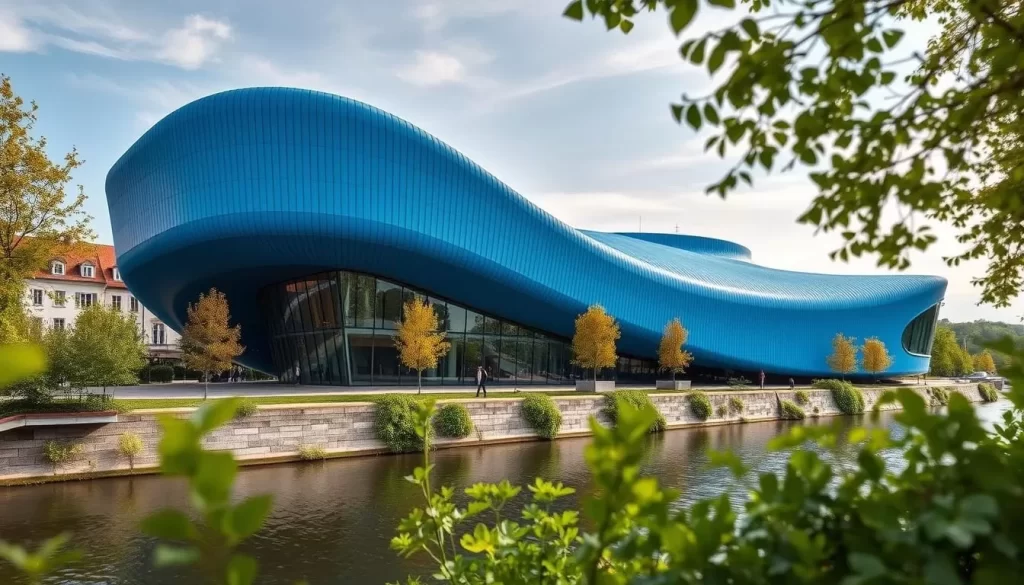
Graz’s modern art scene is epitomized by the Kunsthaus Graz, affectionately known as the ‘Friendly Alien’. This futuristic building is a striking contrast to the historic architecture that dominates the city. Built in 2003, when Graz was the European Capital of Culture, the Kunsthaus Graz has become a landmark and a symbol of the city’s embrace of modernity.
Contemporary Art in a Futuristic Building
The Kunsthaus Graz is more than just a visually striking building; it’s a vibrant art museum that hosts temporary exhibitions on its first floor. These exhibitions showcase contemporary art from the 1960s onwards, challenging perceptions and sparking dialogue.
Best Viewpoints to Photograph the Alien
To capture the essence of the ‘Friendly Alien,’ several viewpoints around Graz offer stunning perspectives. The Schlossberg Clock Tower provides a panoramic view, while crossing the Mur River offers a unique vantage point to appreciate the building’s futuristic design and its interaction with the surrounding landscape.
Murinsel: The Floating Island on the Mur River
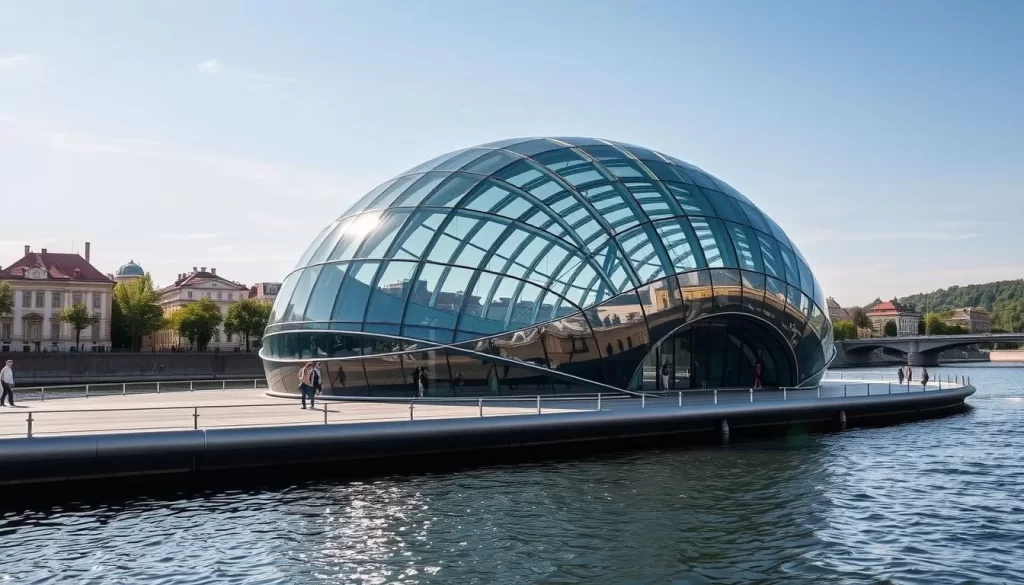
As you explore Graz, you’ll encounter the Murinsel, a striking steel and glass structure that floats on the Mur River, connecting the city’s banks. This innovative floating island is not just a marvel of modern engineering but also a vibrant public space.
The Murinsel, designed by American artist Vito Acconci for Graz’s year as European Capital of Culture in 2003, resembles a giant seashell or half-opened oyster. During the day, the glass of this artificial island glints in the sunshine, linking the riverbanks. At night, it transforms into a colorful spectacle, glowing with blue, pink, and green lights that reflect beautifully on the river’s surface.
This unique building houses a café, an amphitheater for performances, and a playground, making it a perfect spot for both relaxation and entertainment. Whether you visit during the day to enjoy coffee with river views or in the evening to experience its magical illumination, the Murinsel is sure to captivate. It has become a symbol of Graz’s modern identity and its commitment to innovative urban design, complementing the city’s historical architecture rather than competing with it.
Religious and Historical Sites
The city of Graz boasts an impressive array of historical and religious sites that reflect its importance over the centuries. As you wander through the city, you’ll encounter landmarks that have stood the test of time, each with its own story to tell.
St. Giles Cathedral
St. Giles Cathedral, or Grazer Dom, is a prime example of Graz’s rich religious heritage. Erected in the 14th century by Emperor Frederick III, it was later renovated in the Baroque style during the late 17th and early 18th centuries. The cathedral’s understated exterior gives way to an ornate interior, featuring high vaulted ceilings, a magnificent high altar, and stunning stained glass windows that filter in colorful light.
Mausoleum of Emperor Ferdinand II
Adjacent to the cathedral lies the Mausoleum of Emperor Ferdinand II, a testament to Graz’s historical significance. Commissioned by the emperor himself during his reign over Inner Austria, this beautiful structure is a must-visit for anyone interested in the city’s history. Notably, the mausoleum houses a striking red marble sarcophagus, although it contains the remains of the emperor’s mother, not the emperor himself, who rests behind a plain tablet on the wall, a poignant reminder of the passage of time.
![]()
Best Viewpoints in Graz
To truly experience Graz, you need to see it from above, and fortunately, there are several great spots to do just that. The city offers a variety of viewpoints that showcase its unique blend of historical and modern architecture.
One of the best-kept secrets in Graz is the rooftop viewing platform at the Kastner & Öhler department store. Located on the 6th floor, this spot offers spectacular views of the city, including the terracotta rooftops and the iconic Uhrturm tower atop Schlossberg. You can enjoy a coffee or lunch at the rooftop restaurant while taking in the view.
Kastner & Öhler Department Store Rooftop
The Kastner & Öhler department store rooftop is not only a great place to dine but also offers a fantastic vantage point. The viewing platform is free to visit, making it an accessible option for everyone.
Schlossberg Bastion
For a more historical perspective, head to the Schlossberg Bastion, a 16th-century defensive structure that provides a different view of the city. This spot is not only significant for its panoramic views but also for its historical importance in defending Graz against invaders.
Unique Experiences in Graz
Beyond the typical tourist attractions, Graz hides a treasure trove of unique experiences that will leave you with lifelong memories. The city offers a blend of historical significance, cultural richness, and modern entertainment that caters to diverse interests.
Watching the Glockenspiel Performance
One of the charming experiences you can have in Graz is watching the Glockenspiel performance in Glockenspiel Platz. At 11:00, 15:00, and 18:00 daily, two wooden figures emerge from small doors under the ornate clock, dressed in traditional Styrian costumes, dancing in time to the carillon music. It’s a delightful way to spend a few minutes in this beautiful square.
Visiting the Styrian Armoury
The Styrian Armoury, housed in the Landeszeughaus, is the largest historic armoury in the world, boasting an impressive collection of 32,000 pieces of weaponry and armor from the 15th to the 18th centuries. Guided tours are highly recommended to fully appreciate the historical significance of this vast collection.
Searching for Street Art and Murals
Graz is also a canvas for contemporary art, with vibrant street art and murals scattered throughout the city, particularly in the trendy Lend district. Exploring these urban art expressions offers a glimpse into the city’s modern cultural landscape.
These unique experiences not only enrich your visit to Graz but also provide a deeper understanding of the city’s multifaceted character, from its historical heritage to its contemporary cultural vibrancy.
Culinary Delights in Austria’s Gastronomic Capital

In Graz, you’ll discover why it’s considered Austria’s gastronomic capital. The city boasts a rich culinary scene that ranges from traditional Styrian specialties to innovative modern cuisine. You’ll have the opportunity to try local dishes like Backhendl, breaded and deep-fried chicken, and Käsespätzle, a hearty mac ‘n cheese topped with crispy onions.
Traditional Styrian Cuisine
For an authentic taste of Styria, head to Glöcklbräu in Glockenspiel Platz. This traditional restaurant serves local favorites in a cozy atmosphere. Be sure to try their Backhendl, a popular Austrian dish since the eighteenth century, and Käsespätzle, which is sure to satisfy your cravings.
Food Markets and Local Specialties
Kaiser-Josef Market is a must-visit place for food enthusiasts. As the largest of Graz’s 17 farmers’ markets, it offers a wide range of fresh, seasonal produce from local farmers and producers. You can sample cheeses, fruits, vegetables, meats, and fresh flowers, experiencing the best of the region’s culinary delights at this bustling market in the heart of the city.
At any time, you can indulge in Graz’s café culture by visiting historic bakeries like Hofbäckerei Edegger-Tax, which dates back to 1569. The area around the market is also perfect for a leisurely stroll, taking in the sights and sounds of the local food scene.
Eggenberg Palace: A Day Trip Within the City
Eggenberg Palace, a UNESCO World Heritage site, is a compelling reason to visit Graz.
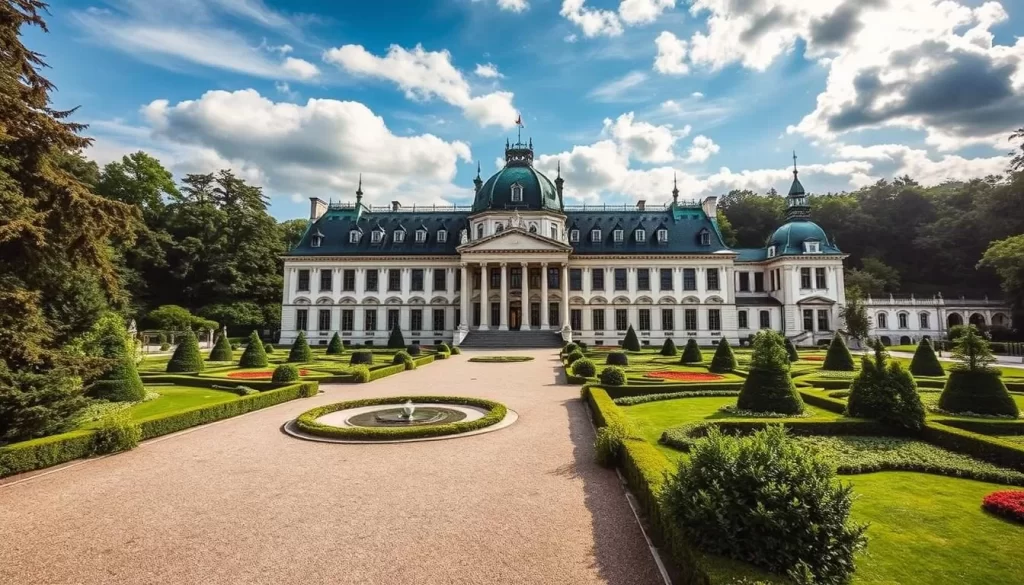
This magnificent Baroque palace is steeped in history and features an intriguing design that incorporates measurements of time. Built in 1625 by Italian architect Giovanni Pietro de Pomis, it’s a must-visit attraction.
The Palace Architecture and Time Symbolism
The palace’s design is replete with symbolism related to time. Notably, it features 365 rooms on each floor, 24 state rooms representing the hours in a day, and 52 doors symbolizing the weeks in a year. Additionally, the palace has 60 windows that look out onto the inspired grounds.
The Beautiful Gardens and Peacocks
The palace gardens are a serene oasis, boasting geometric patterns and peaceful walking paths. The grounds are also home to resident peacocks that roam freely, adding to the enchanting atmosphere.
Quirky and Offbeat Attractions
Graz isn’t just about history; it’s also a city of unexpected surprises. As you explore this charming Austrian city, you’ll discover some truly unique attractions that showcase its playful character.
The Arnold Schwarzenegger Museum
The childhood home of Arnold Schwarzenegger, located in nearby Thal, has been transformed into a museum dedicated to his life and career. This quirky attraction is a must-visit for any Arnie fan, offering a glimpse into the actor’s journey from bodybuilding champion to Hollywood star and politician. The museum features rooms dedicated to each stage of Schwarzenegger’s career, complete with memorabilia and personal items.
Hidden Faces in Church Windows
One of Graz’s best-kept secrets lies within the Stadtpfarrkirche, a church in the heart of the Old Town. Eagle-eyed visitors can spot the faces of Adolf Hitler and Benito Mussolini hidden among the crowd witnessing the torment of Jesus Christ in the stained glass windows. These were crafted by Albert Birkle, an artist whose work was once deemed “degenerate” by Hitler. Birkle’s subtle revenge is a fascinating piece of history that adds a layer of intrigue to your visit.
| Attraction | Description | Location |
|---|---|---|
| Arnold Schwarzenegger Museum | Museum showcasing Schwarzenegger’s life and career | Thal, near Graz |
| Stadtpfarrkirche | Church with stained glass windows featuring Hitler and Mussolini | Graz Old Town |
| Kirche St. Andrä | Functioning church with contemporary art installations | Graz |
These offbeat attractions not only add a unique dimension to Graz’s appeal but also highlight the city’s embrace of both tradition and unconventionality, making it a fascinating place to explore in the world.
Getting Around Graz
Navigating Graz is a breeze, thanks to its compact size and efficient public transportation system. You’ll find that the city is remarkably easy to get around, whether you prefer to walk, take the tram, or cycle.
Efficient Tram Service
Graz’s Old Town trams are free for journeys within the city center, making it a convenient option. The free tram service operates on lines 1, 3, 4, 5, 6, 7, and 23, between Hauptplatz and Jakominiplatz, with an additional stop in each direction.
Walking and Cycling Options
Graz is a very walkable city, with most attractions within comfortable walking distance of each other. You can also rent bikes from hotels like the Grand Hotel Wiesler, allowing you to explore the city on two wheels. Whether you’re traveling by tram, walking, or cycling, you’ll find that getting around Graz is a pleasant experience.
Where to Stay in Graz
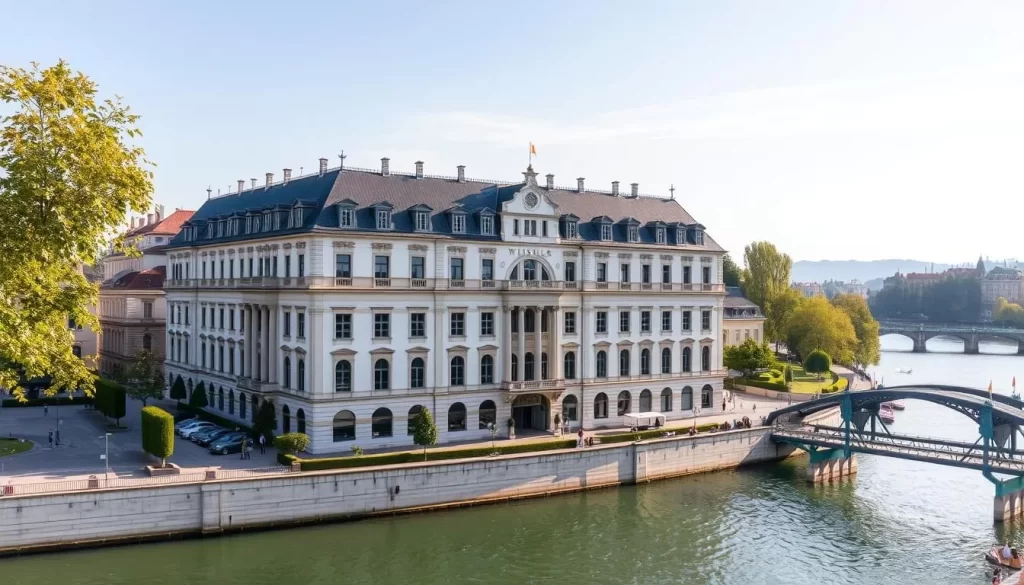
Graz, being a city on a human scale, offers various accommodation options to suit different preferences. You can easily get around on foot or by streetcar, making any neighborhood a great choice. For simplicity, consider staying close to Jakominiplatz station, the city’s hypercenter where all streetcar lines intersect.
One of the top recommendations is the Grand Hotel Wiesler, located in the Old Town. This stylish hotel is within walking distance of major attractions and offers stunning views of the Mur River. The rooms are light and airy, featuring unique elements like exposed plaster and a gorgeous glazed wash basin.
When planning your stay in Graz, consider the distance to key attractions and the convenience of being near public transportation. For a luxurious experience, Grand Hotel Wiesler is an excellent choice. For other options, you can explore mid-range and budget-friendly hotels that offer great value.
To fully appreciate Graz, it’s recommended to stay for at least two to three days. This allows you to explore the city’s hidden gems and enjoy its culinary delights without feeling rushed. Whether you’re looking for historic charm or modern convenience, Graz has a hotel that’s right for you.
Planning Your Perfect Visit to Graz
Graz, a hidden gem in Austria, awaits your visit, and with a little planning, you can enjoy it to the fullest. To make the most of your travel time, consider visiting during spring or autumn for mild temperatures and thinner crowds, or in winter to experience the charming Christmas markets.
With at least two days to explore the city center, you can discover Graz’s rich history and culture. The Graz Card is a great way to make the most of your visit, offering free public transport, access to the funicular, and discounts at various attractions. Plan your visit and make the most of your time in this beautiful Austrian city, easily accessible by train from other Austrian cities.
The above is subject to change.
Check back often to TRAVEL.COM for the latest travel tips and deals.
